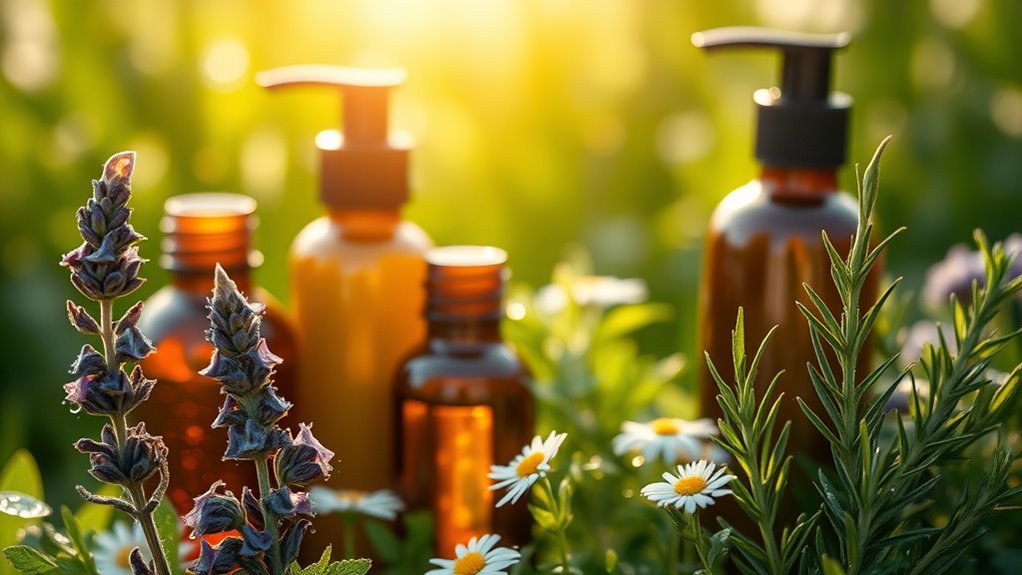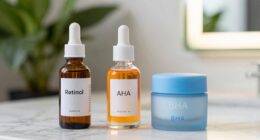Organic beauty products are made with natural, plant-based ingredients that are gentle on your skin and better for the environment. They help reduce exposure to harsh chemicals, lower the risk of allergies, and support healthier skin over time. Many find they work just as well, if not better, than conventional options. Plus, they promote sustainability and ethical practices. If you want to discover how these benefits can transform your skincare routine, there’s more to explore ahead.
Key Takeaways
- Organic beauty products use natural ingredients free from synthetic chemicals, reducing skin sensitivities and allergic reactions.
- They often deliver comparable or superior results due to high-quality, antioxidant-rich natural ingredients.
- Certified organic options ensure safety, purity, and adherence to strict standards, boosting consumer confidence.
- These products support skin health by promoting hydration, elasticity, and brightness without harmful additives.
- Choosing organic aligns with eco-friendly values, supporting sustainability and ethical manufacturing practices.

Have you ever wondered if switching to organic beauty products can make a real difference for your skin? The answer often lies in understanding what these products contain and how they’re made. Organic beauty products are formulated with natural ingredients, which means they avoid synthetic chemicals, parabens, and artificial fragrances. Instead, they rely on plant-based extracts, essential oils, and other natural elements that are gentle yet effective. When you choose these products, you’re opting for ingredients that are minimally processed and free from harmful additives, reducing the risk of irritation or allergic reactions. This focus on natural ingredients not only benefits your skin but also aligns with eco-conscious values, considering the environmental impact of your choices.
Using organic beauty products can *notably* reduce your exposure to chemicals that often accumulate in conventional cosmetics. Many synthetic ingredients have been linked to skin sensitivities and long-term health concerns, so switching to natural ingredients can be a proactive way to care for your skin. These products are often cruelty-free and produced with sustainable practices, which means less harm to ecosystems and wildlife. The environmental impact of conventional manufacturing, including pollution and resource depletion, can be mitigated by choosing organic options. When you support brands committed to eco-friendly practices, you’re contributing to a healthier planet while also nourishing your skin with pure, natural ingredients.
Switching to organic beauty products reduces chemical exposure and supports eco-friendly practices for healthier skin and planet.
You might also notice that organic beauty products tend to have a more authentic scent and texture, thanks to their natural ingredients. This often results in a more pleasant, holistic experience during application. Plus, because many natural ingredients are rich in antioxidants, vitamins, and minerals, they can offer real skin benefits—like hydration, improved elasticity, and a brighter complexion—without relying on synthetic additives. It’s also worth noting that certified organic products often undergo strict standards to ensure purity and safety, giving consumers added confidence in their choices. Over time, many users report better skin health and fewer irritations when switching to organic options, though results can vary depending on individual skin types.
While some skeptics question whether organic beauty products really work as well as conventional ones, many find that they deliver comparable, if not superior, results. The key is choosing high-quality products with proven natural ingredients. The bottom line is that switching to organic beauty products isn’t just about skin health; it’s about making mindful choices that support environmental sustainability. When you prioritize natural ingredients and consider the environmental impact, you’re taking a step toward more sustainable beauty routines that benefit both your skin and the planet.
Frequently Asked Questions
Are Organic Beauty Products Suitable for All Skin Types?
You might wonder if organic beauty products suit all skin types. The good news is, many are formulated with hypoallergenic benefits, making them suitable for sensitive skin. However, since skin reactions vary, it’s wise to check ingredients and do a patch test first. Organic products often avoid harsh chemicals, offering gentle care for diverse skin types. Ultimately, choose products tailored to your skin’s needs for the best results.
How Can I Verify if a Product Is Genuinely Organic?
To verify if a product is genuinely organic, check for organic certification labels like USDA Organic or COSMOS. These certifications guarantee the product meets strict standards. Also, look for ingredient transparency on the label—trust brands that list all ingredients clearly and avoid vague terms. Doing this helps you confirm the product’s authenticity and ensures you’re choosing truly organic options that align with your values.
Do Organic Products Have a Longer Shelf Life?
You might wonder if organic products have a longer shelf life. Generally, they don’t, since they lack synthetic preservatives that promote shelf life extension. Organic formulations rely on natural preservative effectiveness, which can be less potent, leading to a shorter shelf life. To guarantee product freshness, store them in cool, dark places and check expiration dates regularly. Organic products require more careful handling to maintain their quality over time.
Are Organic Beauty Products More Expensive Than Conventional Ones?
You’ll notice that organic beauty products are generally more expensive than conventional ones. The price comparison reflects higher ingredient costs, as organic ingredients often require more careful cultivation and certification. These premium costs are passed on to you, making organic options pricier. However, many find the investment worthwhile due to the purity and fewer chemicals in organic products, which can benefit your skin and overall health.
Can Organic Skincare Products Replace Medicated Treatments?
Imagine replacing your medicated treatments with natural ingredients—sounds ideal, right? However, organic skincare products can’t always match the treatment efficacy of medicated options, especially for severe skin issues. While they work well for gentle maintenance and irritation relief, they often lack the potency needed for serious conditions. Always consult a dermatologist before replacing medicated treatments to make certain your skin gets the care it needs.
Conclusion
Choosing organic beauty products can truly enhance your skincare routine, offering natural ingredients that nourish your skin without harmful chemicals. They often provide better long-term results and support eco-friendly practices. Remember, you get what you pay for—so invest in quality for healthier, glowing skin. As the saying goes, “You are what you eat,” and that extends to what you put on your skin too. Make mindful choices and watch your beauty shine from the inside out.










